A Tale of Super Heroes, Naked Ladies, Show Tunes, & Michael Feinstein
This Story Has Everything! (Remembering Richard Lieberson, 1949-2006)
Does anybody reading this remember Richard Lieberson (1949-2006)? He was an excellent jazz guitarist, whom I had the pleasure of hearing and meeting during his long tenure with Vince Giordano and the Nighthawks. (A note up front: much of this story comes from the late Richard Lieberson himself, as told to me by him about 30 years ago. I was able to verify some of the details, but far from all of them. Plus, I’m relying on personal memories of things told to me many years ago. This is all by way of apologizing if anything in this story turns out to be other than as I remember it and tell the story here.)
Richard, who also played banjo, was one of the few players I met back then who was devoted to the classic pre-modern styles of jazz guitar and banjo. In fact, for a few years before his death at age 57, he had been working on a history of early jazz guitar, up to the start of the modern period. He was an expert on Eddie Lang, Django Reinhardt, Oscar Moore, and anyone else playing up through the swing era. We had many long discussions, and I was able to channel some of that information into my notes for the Mosaic King Cole Trio box and more recently into my 2020 biography of Nat King Cole. I’ll always be grateful for the help he gave me.
(I’m grateful to Ben Freed for posting a modest memorial page to Richard, which is the only place where I have seen Richard’s birth and death dates. Mr. Freed also includes three casual snapshots - virtually the only photos I’ve been able to find of Richard. One last point about Richard: he was a dead ringer for the silent film comedian Ben Turpin; to watch Richard, in a big band for instance, was to wonder how he was able to make himself into such an expert sight-reader with those ping-pong ball eyes. There, I said it!)
I never got to meet Richard’s father, William H. Lieberson (1917-1995), but I learned a lot about him through Richard. Lieberson Sr. was also a music buff, but his great love was the theater, and his day job for most of his life was in publishing.
The New York Times obit for William Lieberson pretty much confirms with what Richard told me. William spent most of his career working as Editor-in-Chief for Fawcett comics. In the 1940s, Lieberson Sr. collaborated with C. C. Beck, one of the all-time great visionaries of the graphic story medium, who created, wrote, and drew the adventures of the original Captain Marvel - known to more recent generations as “Shazam.” Beck’s original Captain Marvel stories are some of the most entertaining comic books of all time - on a par with Jack Cole’s Plastic Man and Will Eisner’s The Spirit. Even though Captain Marvel was admittedly inspired by National Periodical Publications (DC)’s Superman, the original flying strong man, at the height of Captain Marvel’s wartime popularity, he was even outselling Superman himself - mainly thanks to the wit and ingenuity of Beck’s stories
.As every pop culture buff knows (and as I wrote a few years ago in a story for Vanity Fair), DC took umbrage at Fawcett’s star attraction, and dragged Fawcett Publications to court, claiming that Captain Marvel was a plagiarism of Superman. It was a complicated case that’s been much written about, both by comics nerds and law students. By 1950, the original Golden Age of Comic Book Super Heroes was rapidly coming to a close, and Fawcett decided it was wiser to cease and desist. Eventually, DC acquired the rights to the character Captain Marvel although Marvel Comics managed to acquire the rights to the name “Captain Marvel,” and that’s a whole other story.
In the ‘50s and ‘60s, William Lieberson moved to other day jobs. According to Richard - and this is a fact notably absent in the NYT obit - William went to work editing girlie pin-up magazines, These were rivals to Playboy but without the sophistication and intellectual ambitions of Hugh Hefner’s publications. One of Richard’s favorite anecdotes was that he was often asked to write captions for some of these pin-ups: there would be, for instance, a shot of a half-naked model reclining on a sofa, and the caption would read, “When we dropped in on Doris, she was listening with rapturous attention to the new album by Lennie Tristano and Lee Konitz.” Or for a girl swimming topless in a pool, “Whenever Daisy takes a dip, she likes to put Dave Brubeck and Lee Konitz on her hi-fi stereo system.”
For a while, Richard, who by his teens was an impressive jazz guitarist and a historian, also wrote a music column for one of the “stroke books,” as he called them. In fact, when I worked at Stash Records in the 1980s, I would occasionally receive a clipping from one of these magazines - I never saw the whole publication, only the clips of Richard’s column - to ensure that we would keep sending him review copies of our latest albums.
But at the same time, William Lieberson was indulging his great passion, which was the theater. He had been working on the side as a reviewer, which l suspect he did primarily for the chance to get tickets to all the shows he wanted to see, as well as copies of all the original cast albums as they were released - more on that presently.
In 1975, William founded and served as Artistic Director for his own theater company, the Quaigh Theater, where he directed many, many shows over a period of two decades. His crowning achievement might be that he wrote a play called Springtime Follies which ran on Broadway - apparently only for two nights - in 1951. (Although it was not a musical, it starred the great song-and-dance man Jack Whiting.) According to the Times, another play, Private Stock, was a success in regional theater.
But William loved theater music as much as Richard loved jazz, and, by the time of his death, he had accumulated a collection of pretty much every original cast ever released, including a few monumental rarities. I have no doubt that William H. Lieberson would have been happy that his obituary in the Times described him firstly and foremostly as a director rather than for his contribution to comic book arts.
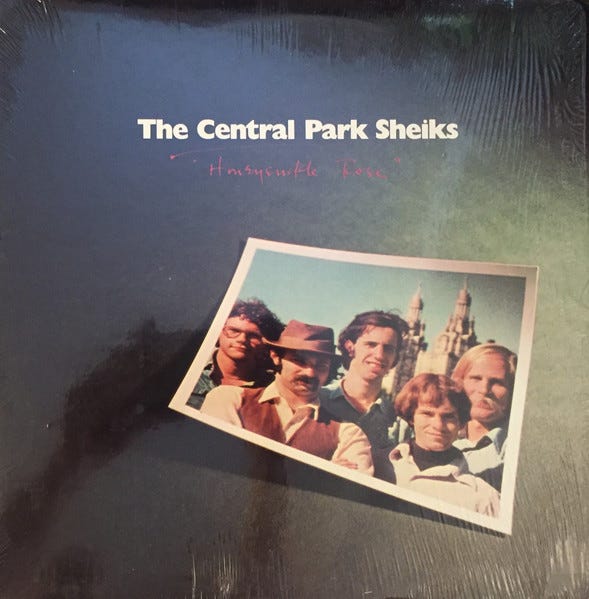
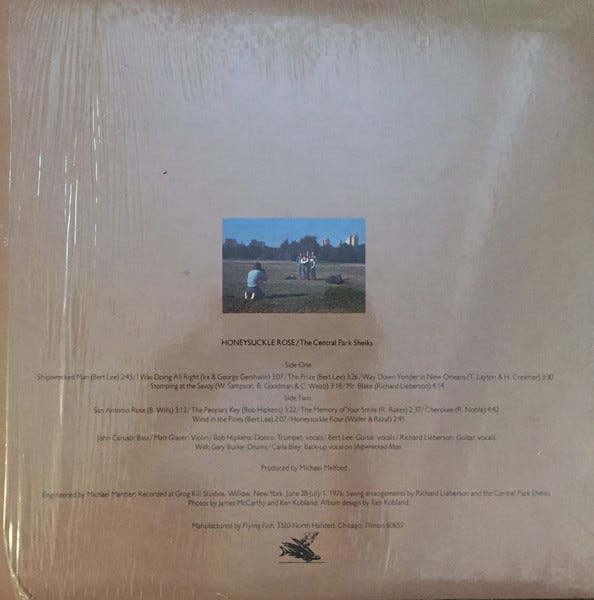
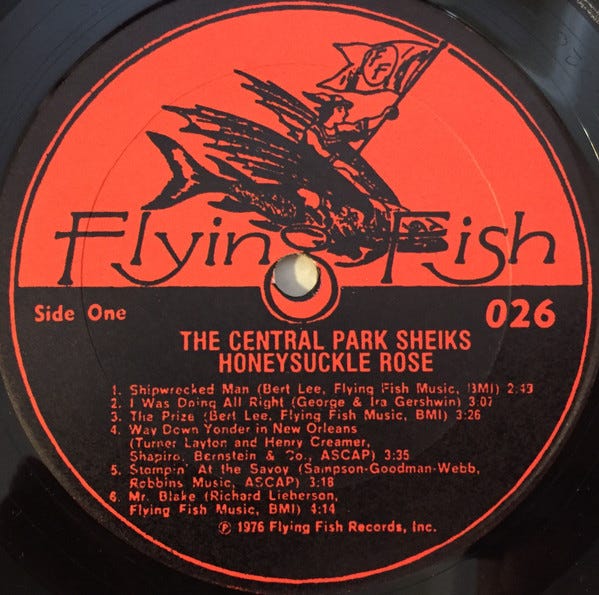
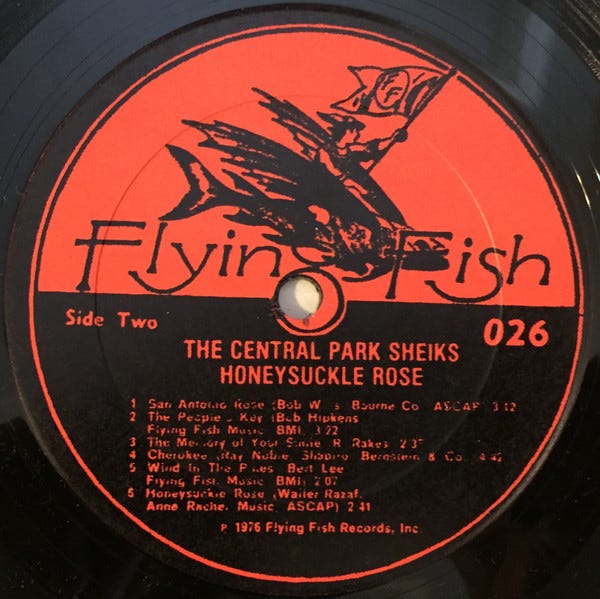
In the meantime, Richard was supporting himself playing guitar and banjo. He was a founder of a group called The Central Park Sheiks, which, in 1976, made one album for Flying Fish Records, more or less in the style of the 6 and 7/8ths String band or R. Crumb’s Cheap Suit Serenaders; this group played jazz standards like Benny Goodman’s “A Smoo-oo-th One” as well as bluegrass and folk and “Lovesick Blues” a la Hank Williams. Richard also made an album in 1996 with a group called The Splendid Jazz Band, which featured drummer Rob Garcia, who also worked with Vince Giordano and many other New York bands including his own, and Rob’s father, bassist Joe Garcia.
Richard was interested in all kinds of jazz, a lot of rock and blues, and he was a very enthusiastic fan of country music. He recounted playing in a tribute band for Bob Wills and his Texas Playboys in which everybody in the ensemble insisted on being the one to yell “ah ha!” in an approximation of Wills’s signature falsetto yodel. As a country musician who happened to be Jewish, he delighted in describing himself as a “Hayseed Hasid.”
But one thing Richard didn’t particularly care for, as distinct from his father, was show tunes. He could see the value of songs like “Surrey with the Fringe on Top” as source material for purposes of jazz interpretation, but you would never catch him listening to the original cast recording of “Oklahoma!”
Thus when William H, Lieberson died at the age of 79 in 1995, Richard was at a loss over what to do with his father’s collection of show albums. He gave me a call, and offered me the whole works for $1 a pop. I didn’t hesitate for a moment, I said yes, and soon they were carting them over to my office on Broadway and 28th St.
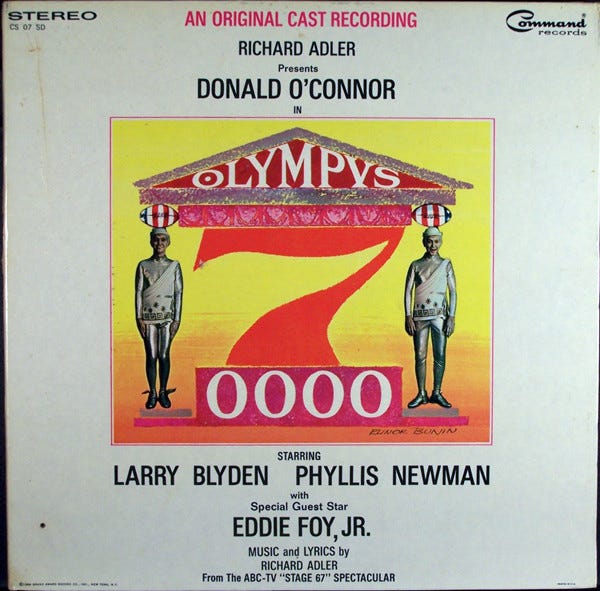
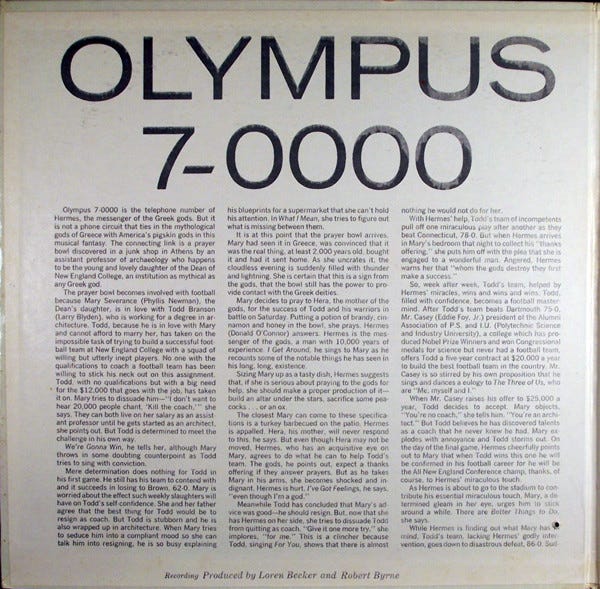

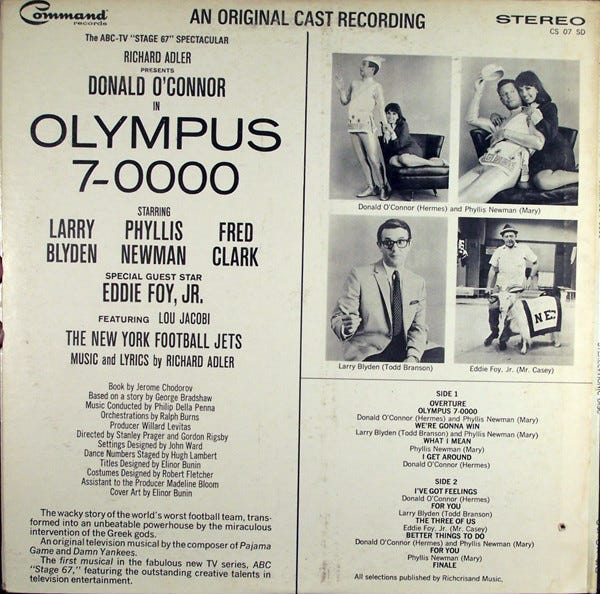
The interesting thing was that, not surprisingly, the albums from the classic shows, the Rodgers & Hammersteins and Lerner & Loewes, were in terrible, ratty condition, from having been played and enjoyed so many times. The more obscure - and relatively valuable - vinyls were in perfect condition; doubtlessly William had barely played some of these more than once. Among these were Olympus 7-0000, the soundtrack of a 1966 made-for-TV musical with Donald O’Connor, Phyllis Newman, and Larry Blyden, produced and composed by Richard Adler,.
For the next 15 years or so, these 300-500 or so original cast albums were my crash course in musical theater. By 2009, I had amassed practically all of them - and a great many more besides - on compact disc.
It was at that time I made the tumultuous decision to deacquisition, as they say, all of my vinyl holdings. My collection was about 14,000 LPs, nearly all of which - except for the Lieberson cast album subcollection - were jazz and jazz-oriented vocals, and I was housing them in a Manhattan apartment
I approached Michael Feinstein, who was then establishing what is now known as the Great American Songbook Foundation in Carmel, Indiana. To my delight, he told me that he’d be happy to accept my vocal, show, and soundtrack albums as a donation, and for roughly 15 years now, they have resided in that archive as “The Herb and Will Friedwald Collection.” Like I say, I had never met William Lieberson, and never really researched his life at all until this current Substack story. Knowing what I know now, those cast albums should be in the Songbook Foundation archive as The William Lieberson Collection.
Although, perhaps ironically, one album I have never been able to re-acquire was Olympus 7-0000.
PS: Thanks to the wonderful STEPHANIE SIMON for doing this story on NY1 on the Friedwald collection in 2009, and thanks to John Aldrich for posting it:
Very Special thanks to the fabulous Ms. Elizabeth Zimmer, for expert proofreading of this page, and scanning for typos, mistakes, and other assorted boo-boos!
TWO HIGHLY-RECOMMENDED FORTHCOMING EVENTS AT THE TRIAD - both on Sunday Oct 27:
A matinee screening of the Twilight Zone episode “A Stop at Willoughby” (creator Rod Serling’s favorite episode) and the 1968 cult film The Swimmer (starring Burt Lancaster, based on John Cheever’s greatest short story) is at The Triad Theater, a cabaret-sized upstairs room on West 72nd street, sporting a brand new 4k projection system with 12.3 surround sound, on Sunday, October 27 at 2:00PM (note updated date & time) : for more info bit.ly/3MUMQ5k
Read Arlen’s article about “The Twilight Zone and The Swimmer”: bit.ly/47y8sxY
Private Event for SLOUCHING TOWARDS BIRDLAND subscribers!
(for details please write me @ wfriedwald@gmail.com)
SUNDAY OCTOBER 27
8:00PM (though I am hoping we can open the doors at 7:30PM)
please RSVP first!
The Triad Theater &
Will Friedwald's CLIP JOINT present
LIKE TOTALLY TOGA-LICIOUS!
THE BIG HALLOWEEN 2024 TOGA PARTY
featuring a screening of RICHARD LESTER's great 1966 film version of STEPHEN SONDHEIM'S classic Broadway musical, A FUNNY THING HAPPENED ON THE WAY TO THE FORUM
starring ZERO MOSTEL, JACK GILFORD, MICHAEL CRAWFORD. PHIL SILVERS & BUSTER KEATON
plus a mini Clip Joint Broadway mixtape of classic FORUM numbers from vintage 1960s variety shows.
no cover - but we will ask everyone to kick in a little $ (on a volunteer basis) to pay the projectionist
drinks available & encouraged (cash bar)
Proper ANCIENT ROMAN / TOGA attire recommended!
SLOUCHING TOWARDS BIRDLAND is a subStack newsletter by Will Friedwald. The best way to support my work is with a paid subscription, for which I am asking either $5 a month or $50 per year. Thank you for considering. (Thanks as always to Beth Naji & Arlen Schumer for special graphics.) Word up, peace out, go forth and sin no more! (And always remember: “A man is born, but he’s no good no how, without a song.”)
Note to friends: a lot of you respond to my SubStack posts here directly to me via eMail. It’s actually a lot more beneficial to me if you go to the SubStack web page and put your responses down as a “comment.” This helps me “drive traffic” and all that other social media stuff. If you look a tiny bit down from this text, you will see three buttons, one of which is “comment.” Just hit that one, hey. Thanks!



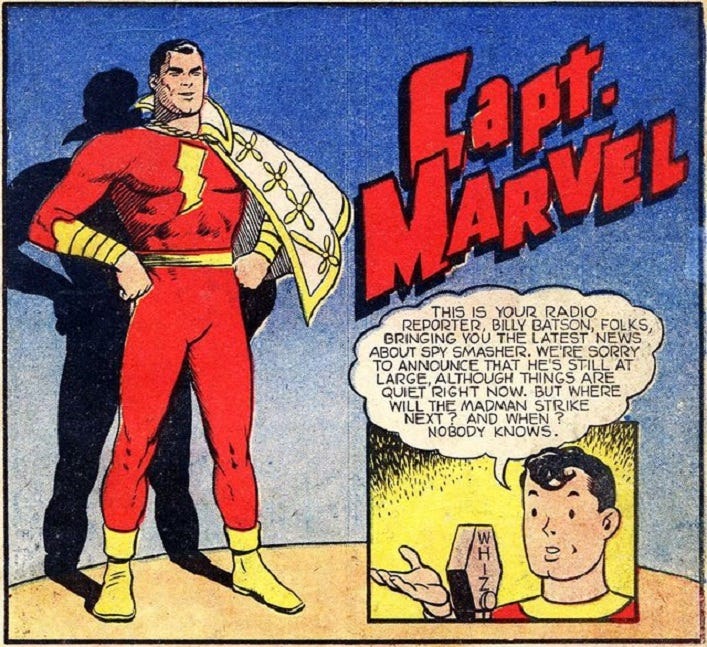

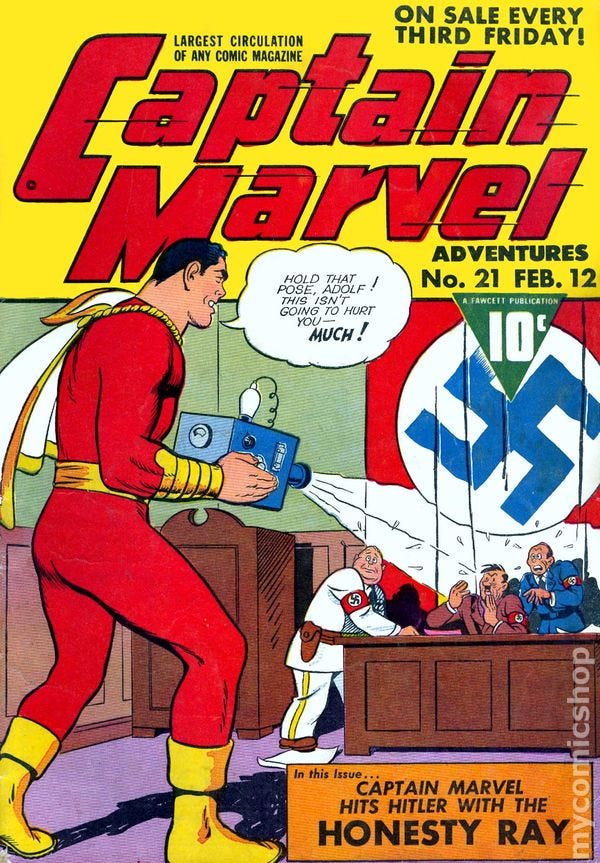
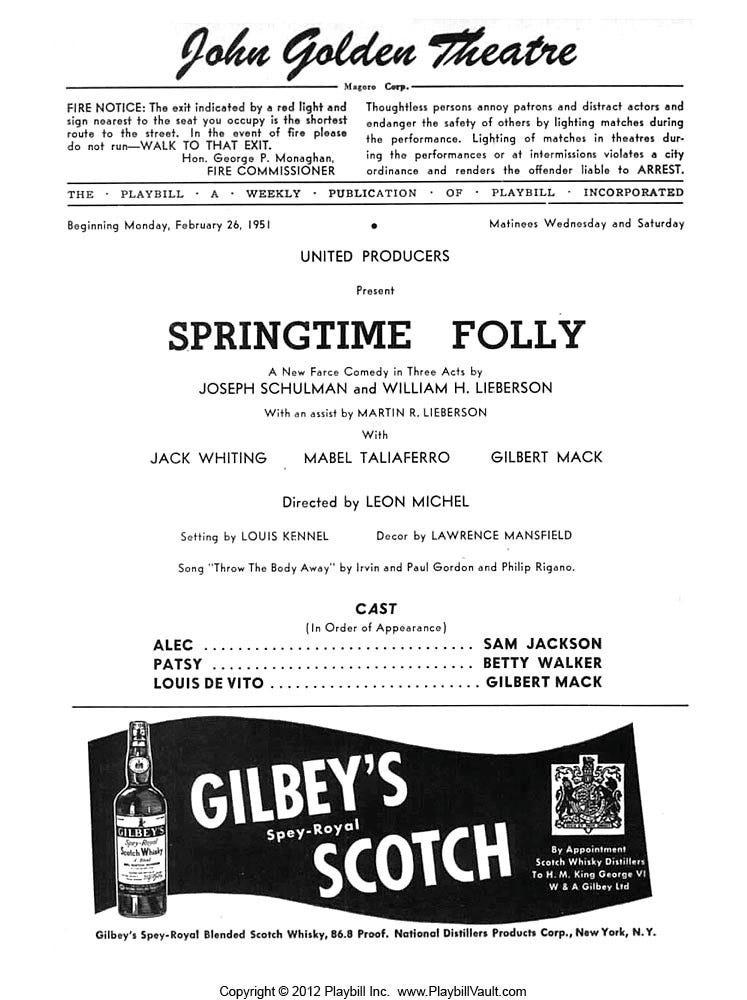

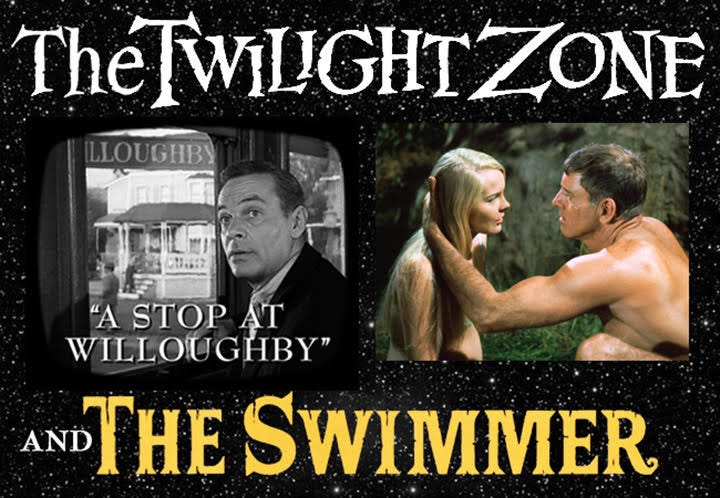
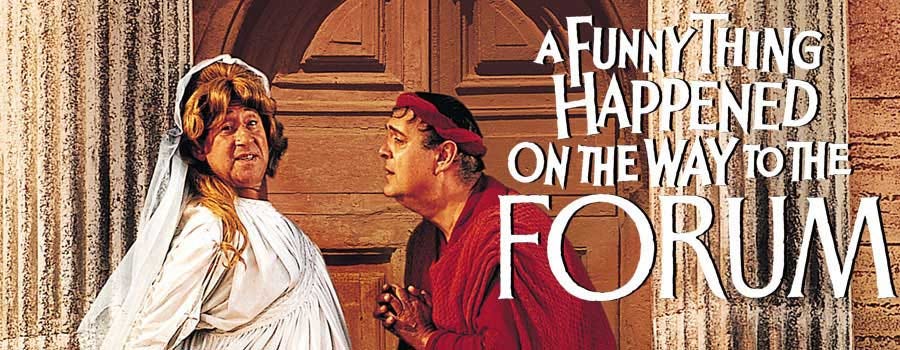

Hi, and thank you for this reminiscence of Richard and his father Will. I knew them both, but Will only casually. So thank you for filling in details on Will's background and interesst, only some of which I was aware of.
Richard was one of my very best friends from the late '80s, when we met, until 2006 , when he died. To me, he was a musical and literary mentor and, well, a character. Richard's brother, Dennis, put the epitaph on his tombstone: "Musician, Writer, Curmudgeon."
(By the way, I'm not sure you're aware that Ben Freed died quite a few years ago. I don't remember exactly when. His death was a great loss to the local Bluegrass community.)
As a minor correction, the models in the girlie magazines were not half-naked. They were completely naked. The best story of them all, IMO, was that when Richard came home early from a friend's bar mitzvah one day, he found a girly shoot taking place in his bedroom. The shot of the model's naked body making its way up or down the double decker bed Richard shared with Dennis made the cover.
An interest of Richard's that did not come up in your article was his deep knowledge of noir fiction and film. He collected noir paperbacks, which were sold in drug stores and cigar shops next to the girlie magazines. Richard's collection specialty was the cover art. He knew the artists and wrote at least one fanzine article about a favorite. It was Richard who introduced me to Jim Thompson, Lawrence Block and their predecessors.
As a collector (of all sorts of things), Richard knew and had catalogued everything he had — music as well as pulp fiction. When he died, Charles Ardai (founder and editor of the Hard Case Crime line of crime novels), whom I knew professionally, helped Richard's brother, Dennis go through the collection and get good prices for the most valuable ones.
Here's one more note on Richard as an author. When he got interested in Western Swing in the early 1970s, he attended the annual Bob Wills memorial in Turkey, Texas, and interviewed Eldon Shamblin, the pre- and (together with Junior Barnard) post-war guitarist in the Texas Playboys. Richard published an article on the technical aspects of Eldon's guitar style, which was probably the first article of its kind. The article probably had a lot to do with the still ongoing revival of Western Swing. In Richard's manuscript on early jazz guitarists, he has a section on Eldon, where he makes it clear that he considers Eldon to be in "the pantheon", Richard's term.
Thank you again for your reminiscence. I think of Richard very often.